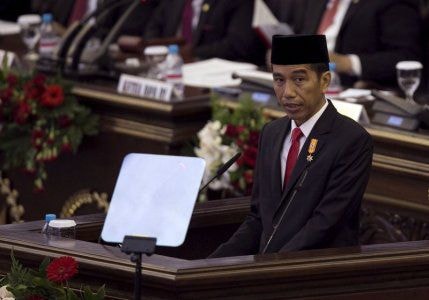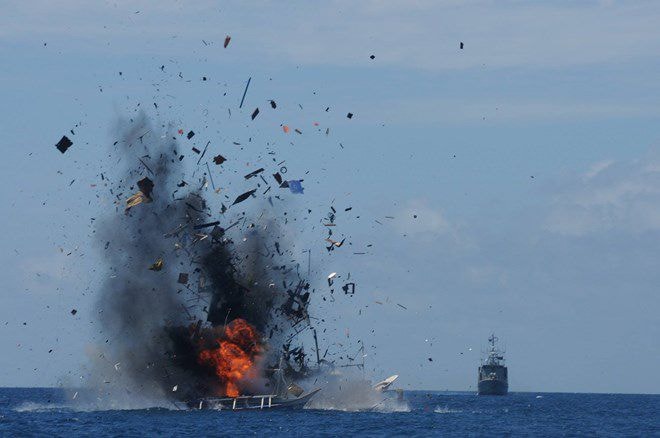Indonesian President: "Shock Therapy" or Extreme Nationalism?
(Baonghean) - It was thought that the "shock therapy", specifically the sinking of all fishing vessels violating sovereignty in fishing, which the Indonesian President applied immediately after taking office, would be reconsidered because it had received a lot of criticism. But no, on August 18, 34 foreign fishing vessels continued to share the same fate as the previous vessels. Although he was "familiar" with the toughness of the leader of the archipelago country, the suspicions that the "shock therapy" that President Joko Widodo is applying seems to have something to do with narrow-minded extreme nationalism, which is not without basis.
President Joko Widodo was born on June 21, 1961, and is often known by his nickname Jokowi. He was the mayor of Surakarta. He was chosen by his party, the Indonesian Democratic Party of Struggle (PDI-P), to run for governor of Jakarta. He won the election in September 2012 after a second round of voting, in which he defeated incumbent governor Fauzi Bowo. Jokowi's victory gave a general view as reflecting the voters' choice for a leader with a "new" and "clean" political style. On July 9, 2014, he was one of two candidates running for president of Indonesia. He ran against Prabowo Subianto, a former army general. On July 22, 2014, Jokowi was announced as the president-elect of Indonesia, winning with 53.15% of the vote compared to his opponent Prabowo's 46.85%.
 |
| Indonesian President Joko Widodo. Photo: Internet. |
Taking office as President of Indonesia in the context of the economy being in a state of stagnation due to laxity in the law. Along with that, the situation of corruption has become a chronic disease for many years without a specific cure, causing extreme frustration among the people. Therefore, many analysts believe that a young person with only enthusiasm will find it difficult to achieve success in the near future. Because the skills to run a country will certainly be different from when he was a Governor and this he still lacks, especially in foreign affairs.
And indeed, political analysts were right, because since becoming President of Indonesia, the achievements he has brought have only been to a certain extent. Specifically, in terms of economy, just one month after taking office, the President of Indonesia has successively cut fuel subsidies (accounting for 20% of the national budget) and increased fuel prices by up to 30%. Although this is an unpopular reform policy, as more than 40% of the population of 250 million people have to live below the threshold of 2 USD/day, to some extent it has been highly appreciated by many analysts and donors. This policy can release important funds for infrastructure development, which is severely lacking in a country with 17,000 islands and islets; or the way the AirAsia airline accident at sea, specifically flight number QZ8501, has been welcomed by the people and the international community. Mr. Widodo was resolute, ordering a review of aviation safety regulations and close cooperation in search and rescue efforts. On the political front, the President of Indonesia decided to maintain universal suffrage in local and regional elections (for mayors and state governors).
Despite some achievements in the economic and political fields, it is undeniable that there has been an erosion of the people's trust in the current President. Those who once placed high hopes on Mr. Widodo in the fight against corruption seem to be very disappointed. And the current President is also facing many harsh criticisms for appointing a person under the corruption investigation to lead the national police force.
In terms of diplomacy, it is clear that Indonesia's determination to execute six drug criminals, including five foreigners, has caused a diplomatic storm with Brazil and the Netherlands. The two countries whose citizens were executed have recalled their ambassadors. Despite international pressure and more than 30 foreign death row inmates awaiting execution, Jokowi's declaration that he will not give in risks being strongly criticized at home. According to the assessment of the executive director of the Setara Institute for Human Rights, "Indonesia is now going backwards". Because previously, former President Susilo Bambang Yudhyono had announced that Indonesia was moving towards a moratorium on the death penalty.
 |
| A foreign fishing boat was sunk in Indonesia. |
It is known that according to the Jakarta government's calculations, the fact that up to 5,400 ships operate illegally in Indonesian waters every day has caused damage to the archipelago country of more than 24 billion USD, which is a huge number. But the legality of the "Shock Therapy" policy that Indonesia is implementing is still a controversial topic. While President Widodo and his subordinates always affirm that Indonesia affirms that the policy is completely in accordance with Indonesian law as well as the 1982 United Nations Convention on the Law of the Sea (UNCLOS 1982). However, Article 73 of UNCLOS stipulates many measures that can be applied to enforce the laws and regulations of coastal states in the exclusive economic zone, but this does not include sinking ships. In addition, what hinders Indonesia in implementing its anti-illegal fishing policy is that it must fulfill its obligation to immediately release people and vehicles as stipulated under UNCLOS 1982.
On August 20, the Vietnamese Ministry of Foreign Affairs sent a diplomatic note to Indonesia regarding this matter and requested that Indonesia, when handling Vietnamese fishermen who violated Indonesia's territorial waters, must be consistent with the strategic partnership between the two countries, both members of ASEAN, and in the spirit of humane treatment of fishermen. On the same day, Vietnamese Foreign Ministry Spokesperson Le Hai Binh spoke out: "Once again, we express our deep concern over the fact that Indonesian authorities sank a number of Vietnamese fishing boats that violated Indonesia's waters."
On December 31, the ASEAN Community will be established and is expected to create a comprehensive strength in economic development, defense and regional stability. Meanwhile, according to statistics, the problem of sovereignty violations in fishing does not only occur in Indonesia but is a problem for all ASEAN countries.
It is known that violations of the law must be punished, but all laws are based on common standards and are in relation to international law, specifically UNCLOS 1982. And if so, is President Jokowi's action a form of extreme nationalism? The question is, if all countries behave or retaliate against each other, is a peaceful, unified and fully trustworthy ASEAN a distant dream?
Southern Scenery
| RELATED NEWS |
|---|






